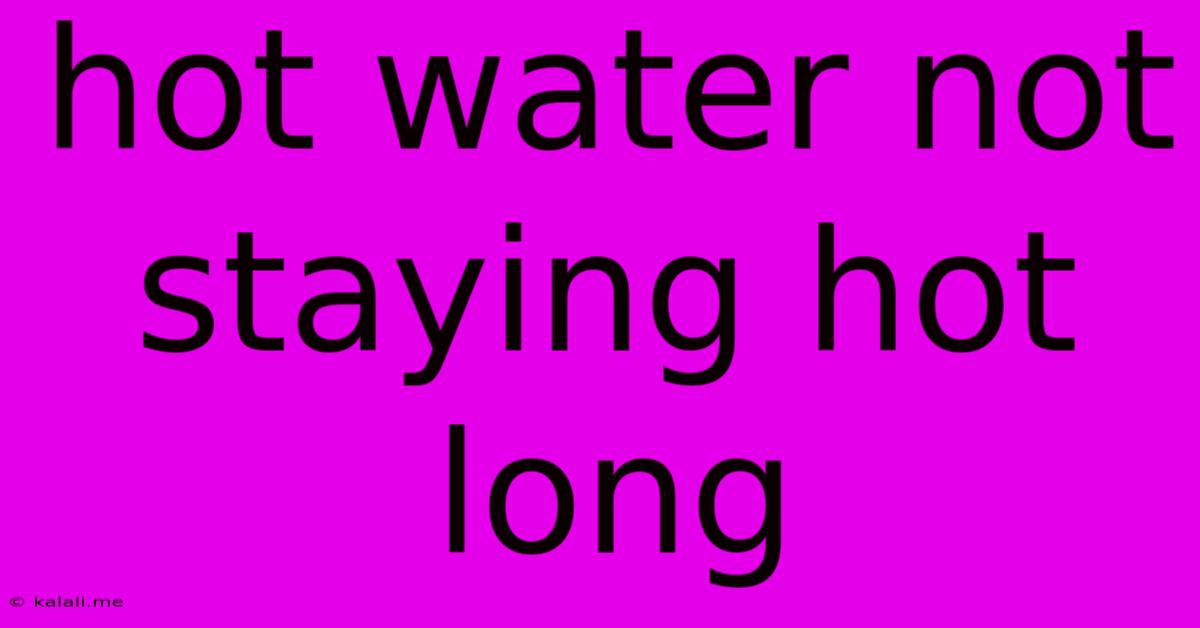Hot Water Not Staying Hot Long
Kalali
Jun 08, 2025 · 3 min read

Table of Contents
Hot Water Not Staying Hot Long? Troubleshooting Your Water Heater Woes
Is your hot water disappearing faster than a magician's rabbit? Frustrating, right? This common household problem can stem from several sources, from simple fixes to more significant issues requiring professional help. This guide will walk you through troubleshooting why your hot water isn't staying hot long enough, helping you diagnose the problem and find the solution.
Common Causes of Quickly Cooling Hot Water
Several factors contribute to your hot water disappearing too quickly. Let's explore the most frequent culprits:
1. Low Water Heater Temperature Setting
This is often the simplest fix. Check your water heater's thermostat setting. Many homeowners set it too low to save energy, resulting in lukewarm water that doesn't last. Increase the temperature gradually – consult your water heater's manual for optimal settings – and monitor how long the hot water lasts. Aim for a temperature between 120°F and 140°F (49°C and 60°C) to balance energy efficiency and adequate hot water supply.
2. Sediment Buildup in the Tank (Tank Water Heaters Only)
Over time, sediment accumulates at the bottom of tank water heaters. This sediment acts as an insulator, reducing the efficiency of heat transfer and leading to faster cooling. Regular flushing of your water heater can remove this sediment, restoring its performance. Consult your owner's manual or find online tutorials for safe and effective sediment flushing procedures. Remember to turn off the power or gas supply before attempting any maintenance.
3. Leaky Faucets and Fixtures
A dripping faucet or a leaky showerhead might seem insignificant, but they contribute significantly to hot water depletion. Even a small leak can waste gallons of hot water daily. Inspect all your faucets and showerheads for leaks. Repair or replace any faulty fixtures to conserve water and maintain a consistent hot water supply. Consider installing low-flow showerheads and faucet aerators to further reduce water consumption.
4. Insufficient Water Heater Size
If you've recently added fixtures or experienced increased household occupancy, your existing water heater may be too small to meet your demands. A larger family or additional bathrooms will require a water heater with a larger capacity. This is a more significant issue requiring professional assessment and potentially the installation of a larger water heater.
5. Malfunctioning Water Heater Components
Issues with your water heater's heating element (electric heaters) or burner (gas heaters) can dramatically affect its performance. A faulty heating element or burner won't heat the water efficiently, leading to lukewarm water or insufficient hot water supply. This often requires professional repair or replacement of the damaged component. Listen carefully for unusual noises emanating from your water heater; strange sounds may indicate a serious problem.
6. Poor Water Heater Insulation
A poorly insulated water heater loses heat to the surrounding environment more quickly. This can result in rapid cooling of the stored water. While you might not be able to improve insulation significantly on an existing water heater, ensure that the unit is not placed in an uninsulated space, exposed to drafts, or in direct sunlight.
7. Excessive Water Usage
Consider your daily water usage habits. Long showers, frequent laundry cycles, or running the dishwasher repeatedly can all deplete your hot water supply faster than normal. Becoming more mindful of water consumption through shorter showers, washing full loads of laundry, and efficient dishwashing practices will help preserve your hot water.
When to Call a Professional
If you've checked all the above points and your hot water is still not staying hot, it's best to contact a qualified plumber or water heater technician. They can diagnose more complex issues and provide professional repairs or replacements. Ignoring a problem can lead to further damage and costly repairs later. Remember safety first: always turn off the power or gas supply before attempting any repairs yourself.
By following these troubleshooting tips, you should be well on your way to enjoying a consistent supply of hot water. Remember, preventative maintenance is key; regular inspections and cleaning can prevent many problems before they occur.
Latest Posts
Latest Posts
-
Seurat Percentage Of The Largest Gene Expression
Jun 08, 2025
-
Saints Row Iv Re Elected Cheats
Jun 08, 2025
-
How Do You Get A Screw Out
Jun 08, 2025
-
How Do I Get Rid Of Gophers In My Yard
Jun 08, 2025
-
How To Clean Glass Range Top
Jun 08, 2025
Related Post
Thank you for visiting our website which covers about Hot Water Not Staying Hot Long . We hope the information provided has been useful to you. Feel free to contact us if you have any questions or need further assistance. See you next time and don't miss to bookmark.